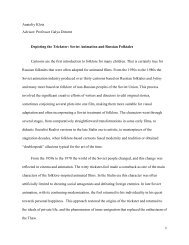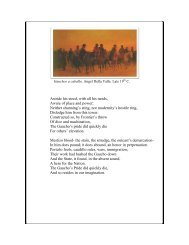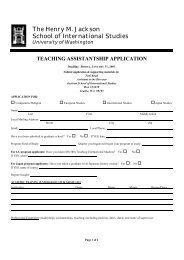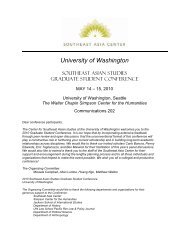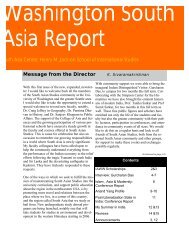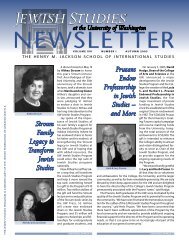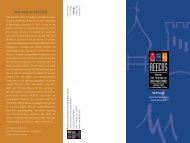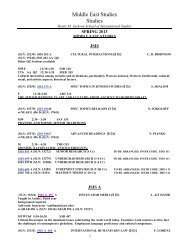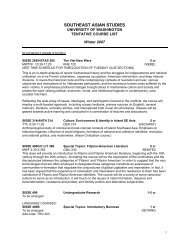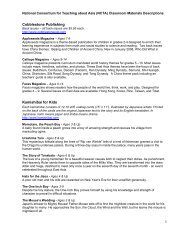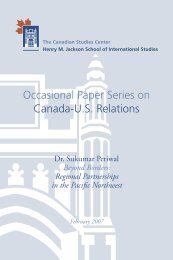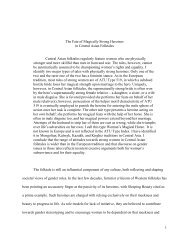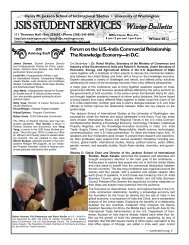jewish studies jewish studies - Jackson School of International ...
jewish studies jewish studies - Jackson School of International ...
jewish studies jewish studies - Jackson School of International ...
You also want an ePaper? Increase the reach of your titles
YUMPU automatically turns print PDFs into web optimized ePapers that Google loves.
SAMUEL & ALTHEA STROUM ANNUAL LECTURE SERIES ~ APRIL 14, 19 & 21, 2004<br />
Pr<strong>of</strong>essor Susan Handelman will present “Find Yourself a Teacher:<br />
The Mentor-Disciple Relation in Jewish Thought<br />
and Contemporary Cultural Studies”<br />
Susan A. Handelman, Pr<strong>of</strong>essor <strong>of</strong><br />
English at Bar-Ilan University, Israel, will<br />
deliver the 2004 Samuel and Althea<br />
Stroum Lectures. Her topic is “Find<br />
Yourself a Teacher: The Mentor-Disciple<br />
Relation in Jewish Thought and Con-<br />
Susan Handelman temporary Cultural Studies.” The<br />
lectures will take place in Kane Hall 220,<br />
beginning at 7:30 PM each evening.<br />
Pr<strong>of</strong>essor Handelman is a teacher extraordinaire, named<br />
a “Top Ten” teacher at College Park (Diamondback student<br />
newspaper) and “Teacher <strong>of</strong> the Year” (University <strong>of</strong> Maryland<br />
Panhellenic Association). She received the Distinguished<br />
Scholar-Teacher Award 1989–1990 (University <strong>of</strong> Maryland).<br />
Pr<strong>of</strong>essor Handelman has been a pr<strong>of</strong>essor <strong>of</strong> English at<br />
the University <strong>of</strong> Maryland and a visiting pr<strong>of</strong>essor at the<br />
“WEISSLER” CONTINUED FROM PAGE 6<br />
(a feature it shares with Hasidism); use <strong>of</strong> the language <strong>of</strong> therapeutic<br />
culture and acceptance <strong>of</strong> the centrality <strong>of</strong> the individual<br />
in her spiritual and psychological path; and a commitment to<br />
social justice and a left-liberal political stance.<br />
In her second lecture, Weissler observed that the preponderant<br />
majority <strong>of</strong> Renewal’s members (although only about<br />
half <strong>of</strong> its leaders) are women. This reflects what historians<br />
call the “feminization <strong>of</strong> American religion” since the nineteenth<br />
century: as religion has become associated with the<br />
private domain, women have come to predominate in American<br />
religious life. Judaism’s public rituals, by contrast, have<br />
historically been dominated by men. Because men have more<br />
options for Jewish life than women, they may also feel they<br />
have more to lose by affiliating with Renewal. Moreover,<br />
Renewal is explicit about using feminist and gender-neutral<br />
God-language. Since the imagery and language the Western<br />
traditions use for God reflect and reinforce certain types <strong>of</strong><br />
social structures and hierarchies — God was called “King” in<br />
biblical times because kings were the most honored and powerful<br />
members <strong>of</strong> society; God was called Father because<br />
fathers are the heads <strong>of</strong> the household — feminist theology<br />
argues for non-hierarchical God-language and a democratic<br />
social organization. Renewal Jews therefore also turn to<br />
kabbalah and its feminine imagery for the Divine.<br />
In her third lecture, Weissler described the way Renewal<br />
transforms the kabbalistic notion <strong>of</strong> the Four Worlds from a<br />
theory <strong>of</strong> the cosmos to a teaching about the nature <strong>of</strong> the<br />
self. In the fourteenth century, kabbalists invoked the concept<br />
in order to bridge the gap between a transcendent divine and<br />
the world <strong>of</strong> multiplicity and pain. Later, Lurianic kabbalah identified<br />
the four worlds with states <strong>of</strong> meditation at stages <strong>of</strong> the<br />
liturgy, as the mystical adept strove to draw near to the<br />
Godhead. In Hasidism, the doctrine became identified with<br />
inner aspects <strong>of</strong> the psyche, in keeping with Hasidism’s tendency<br />
to psychologize kabbalistic cosmology. Jewish Renewal<br />
even further “psychologized” the four worlds by interpreting<br />
them as aspects <strong>of</strong> human existence. Many renewal liturgies,<br />
Institute for Jewish Studies, Hebrew University in Jerusalem.<br />
At the graduate level she has taught at the Interdisciplinary<br />
Program in Gender Studies: Core Course in Gender in Language<br />
and Literature, Literary Theory, and Critical Thought<br />
and The Teaching <strong>of</strong> Literature. She has taught courses on<br />
The Old Testament and Literary Criticism, Reading the Bible:<br />
Problems <strong>of</strong> Interpretation, American-Jewish Literature,<br />
Women in Jewish Literature, and Literature and Ethics.<br />
Her primary research interest is literary criticism and Jewish<br />
<strong>studies</strong>, especially the relation <strong>of</strong> literature to the<br />
philosophy <strong>of</strong> religion.<br />
Pr<strong>of</strong>essor Naomi Sokol<strong>of</strong>f Awarded<br />
the Samuel and Althea Stroum<br />
Chair in Jewish Studies<br />
At the pinnacle <strong>of</strong> university recognition<br />
<strong>of</strong> faculty excellence is the<br />
position <strong>of</strong> endowed chair. These<br />
positions publicly acknowledge<br />
superior scholarship, and reward<br />
the best faculty at the university.<br />
In 1985, through the extraordinary<br />
generosity <strong>of</strong> Samuel and Althea<br />
Stroum, the only endowed chair<br />
at the <strong>Jackson</strong> <strong>School</strong> was established.<br />
It remains one <strong>of</strong> only three<br />
endowed chairs in the entire Col- Naomi Sokol<strong>of</strong>f<br />
lege <strong>of</strong> Arts and Sciences.<br />
This year, the Stroum Chair has been awarded to<br />
Naomi Sokol<strong>of</strong>f, Pr<strong>of</strong>essor <strong>of</strong> Near Eastern Languages<br />
and Civilization, Women’s Studies, Hebrew<br />
Language and Literature, and The Holocaust. She will<br />
hold the chair for three years, using the resources<br />
provided by the chair to support her research and<br />
her program at UW. In return, she will give public<br />
talks and present a colloquium during winter quarter<br />
2004. Other planning is in process.<br />
for example, interpret the Sabbath morning liturgy as a “spiritual<br />
journey.” Instead <strong>of</strong> focusing on the divine end <strong>of</strong> the<br />
equation, Renewal emphasizes the self, answering the questions<br />
who am I, what is my place in the cosmos, and how can<br />
I encounter the Infinite?<br />
Renewal’s transformation <strong>of</strong> the Jewish mystical tradition,<br />
Weissler argued, should be understood both as part <strong>of</strong> a broad<br />
set <strong>of</strong> changes in American religious life and as an extension <strong>of</strong><br />
the development <strong>of</strong> Jewish mystical thought. In that sense,<br />
Renewal has attempted to create a “Jewish language” in which<br />
to express and shape contemporary American spirituality.<br />
~ Marina Rustow<br />
HAZEL D. COLE FELLOW, 2002–2003<br />
7



